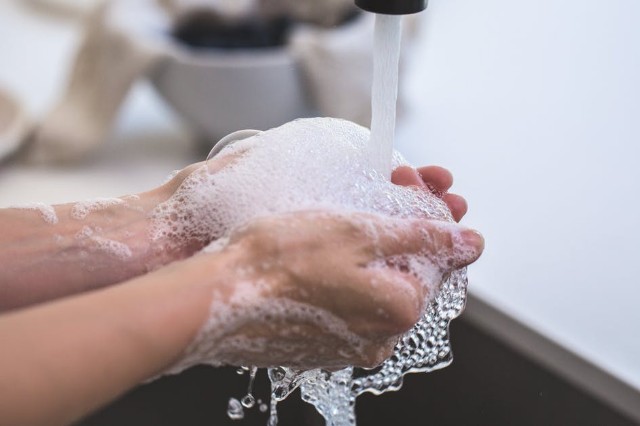
Is your kitchen kept clean and hygienic? You might think so, but studies have shown many experts agree that the home kitchen is the primary location where foodborne outbreaks occur. In fact, over 50,000 people become ill every year in the US from foodborne illness.
For this reason, it’s vital that you know and understands how to keep your kitchen clean, tidy and hygienic to keep your family healthy and safe from these types of preventable foodborne illnesses.
So, how do you ensure that your kitchen area is clean and that it is a safe haven for handling and preparing food?
In this article we share some of the simple ways you can keep your kitchen looking and feeling squeaky clean in a manageable amount of time:
1. Clean up straight after every meal
Let’s face it, preparing and eating meals can be quite messy, especially if you have kids! To keep the area organized and free from bacteria, make sure that you wipe down dirty surfaces after cooking, and wash the dishes after every meal.
It might sound like a simple and obvious tip, but a quick wipe-down of the kitchen floor and surfaces can go a long way in maintaining a pristine kitchen because it removes bacteria immediately and prevents grime buildup that can be more difficult to remove.
Before you cook
Put away the clean dishes, and wash any dirty dishes that are still on the sink. This way, you can start fresh and have plenty of space to prepare a meal making sure the bacteria have been removed.
Setting the table
Make sure that your kitchen table is free from clutter and grime by wiping it down with a natural cleaner.
Managing leftovers
Store any leftover food in containers right as you finish eating, and use it for your next meal right away. If you are packing your lunch, put your desired portion into the appropriate food storage containers.
2. Schedule days for doing a cleaning

Many of us fail to get housework done because we simply forget about it, or more important things come up like helping kids with the homework.
This is totally relatable, and if you find that there is barely any spare time for you to tackle kitchen cleaning, try setting days and times for doing a quick clean –things a simple as wiping grimy surfaces, and organizing the content of your fridge.
Even a 10-minute cleaning routine that involves cleaning the sink and emptying the garbage bin can leave your kitchen smelling and looking clean and can get rid of most of the harmful bacteria lurking around.
If you have a regular schedule, you’re much more likely to stick to it to get things done.
3. Practice good waste management
Good waste management can keep your kitchen and home clean and free of unhygienic bacteria.
To manage your waste and recyclables in the home, get a separate trash bin and recycling container that can both accommodate large amounts of waste. This will help prevent the bins from filling too quickly and overflowing with used packaging.
Recycling is great, but having a bin that is brimming with recyclable items might not only make your kitchen look cluttered, but also spread unwanted germs. Recyclable items include things such as glass jars, soda cans, hard plastics, and aluminum cans.
If you have a pet at home, get a trash bin that requires a pedal to open, to keep your furry friends from raiding the trash. Concerned about trash bins ruining the look of your kitchen? Hide it inside a small cabinet that you can easily access when throwing out waste.
4. Keep your fridge organized
No one wants to sift through a disorganized fridge when you just want to find food to eat! Furthermore, a disorganized fridge is much more likely to contain food that has passed its expiration date, causing a risk of contamination with other food in your fridge.
A super easy idea to keep your fridge organized is to use small plastic baskets to categorize certain foods, such as dairy, meat, and fresh fruit and vegetables. This not only helps keep your fridge nice and organized, but it also allows for much easier cleaning – when needed, just take the baskets out and give them a rinse!
Keeping your food organized in baskets can also help prevent cross-contamination from any spills because it will help keep them contained to the basket and not spread and leak through the entire fridge.
A final tip to keeping your fridge organized is to regularly check for any items that you can get rid of, and don’t let the fridge become crowded with old food and items that do not require refrigeration. For example, many people don’t realize that potatoes, onions, garlic, and basil are just some of the items that will stay fresh even without refrigeration.
5. Clear off your kitchen countertop
A spacious kitchen counter can act as a magnet for clutter. And with more clutter, comes more chance of spills, unwanted germs, and food contamination.
Keep coffee makers and toasters in cupboards when not in use, and store random items like paper and pen in a separate drawer. Note: you need these items for listing your grocery needs, so keep them close. Stash paper towels on cabinets or on top of your fridge so they don’t take up space in your counter.
You can also use mason jars to store dry pasta, sugar, candies, and even grains like rice and oatmeal. This will help keep them sealed and fresh and keep out any bacteria that could cause contamination.
If you have a small kitchen, make the most out space by storing cooking utensils such as spatulas and rolling pins in a jar. Place the jar on your kitchen counter where they are visible and can be accessed easily.
Conclusion
Keeping the kitchen organized and clutter-free is important for a number of reasons. For one, it helps you stay organized and efficient when it comes to preparing meals, which means you can spend more time doing other things you enjoy.
Secondly – and more importantly – it helps you keep a clean and hygienic food preparation area to keep your family safe from food contamination and germs that are likely to cause foodborne illness.
So, remember: a little bit of effort staying clean and organized in the kitchen at home will pay off in the long run!
About The Author:
Penny Loukaitis is the operations manager at Pristine Home and is loves to write and talk about helping busy mums and dads find ways to become more productive at home so they can spend more time with their kids. Penny also loves animals and has 3 beautiful dogs that keep her active, fit and healthy!




